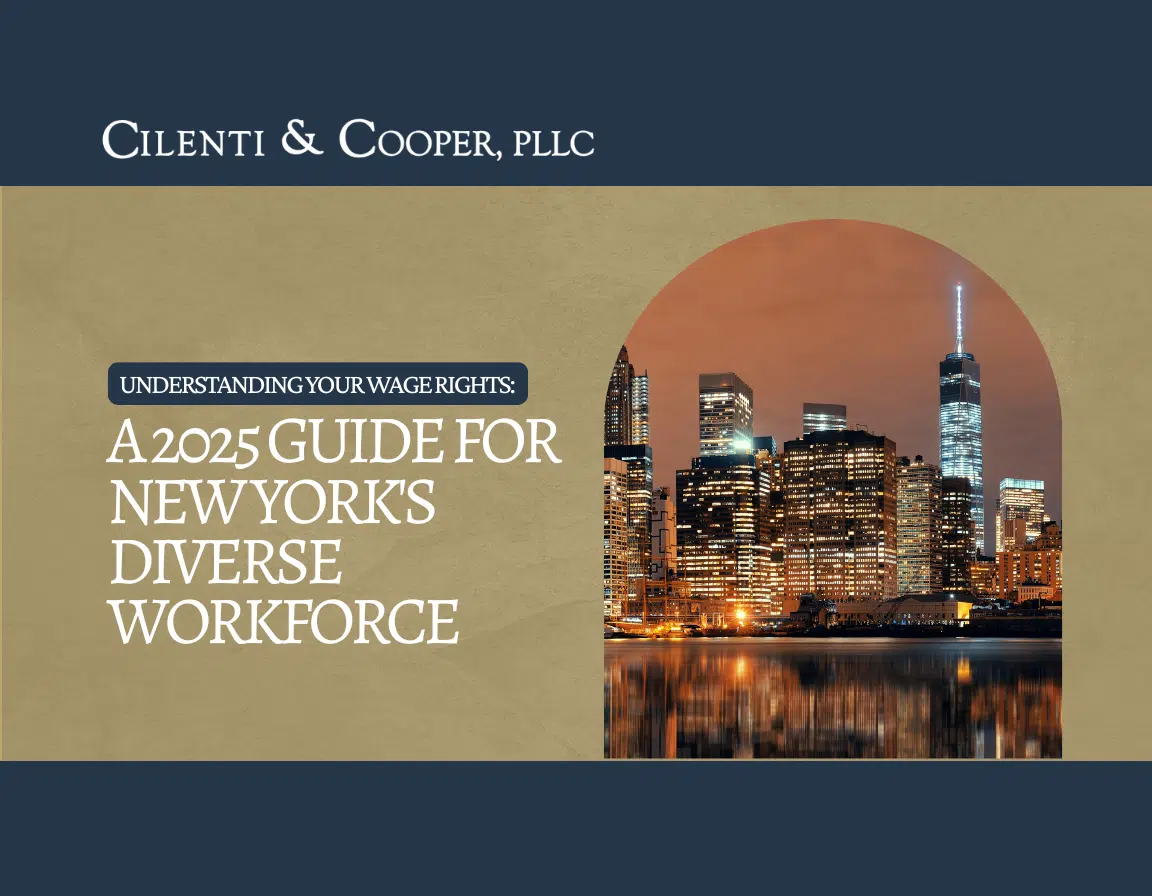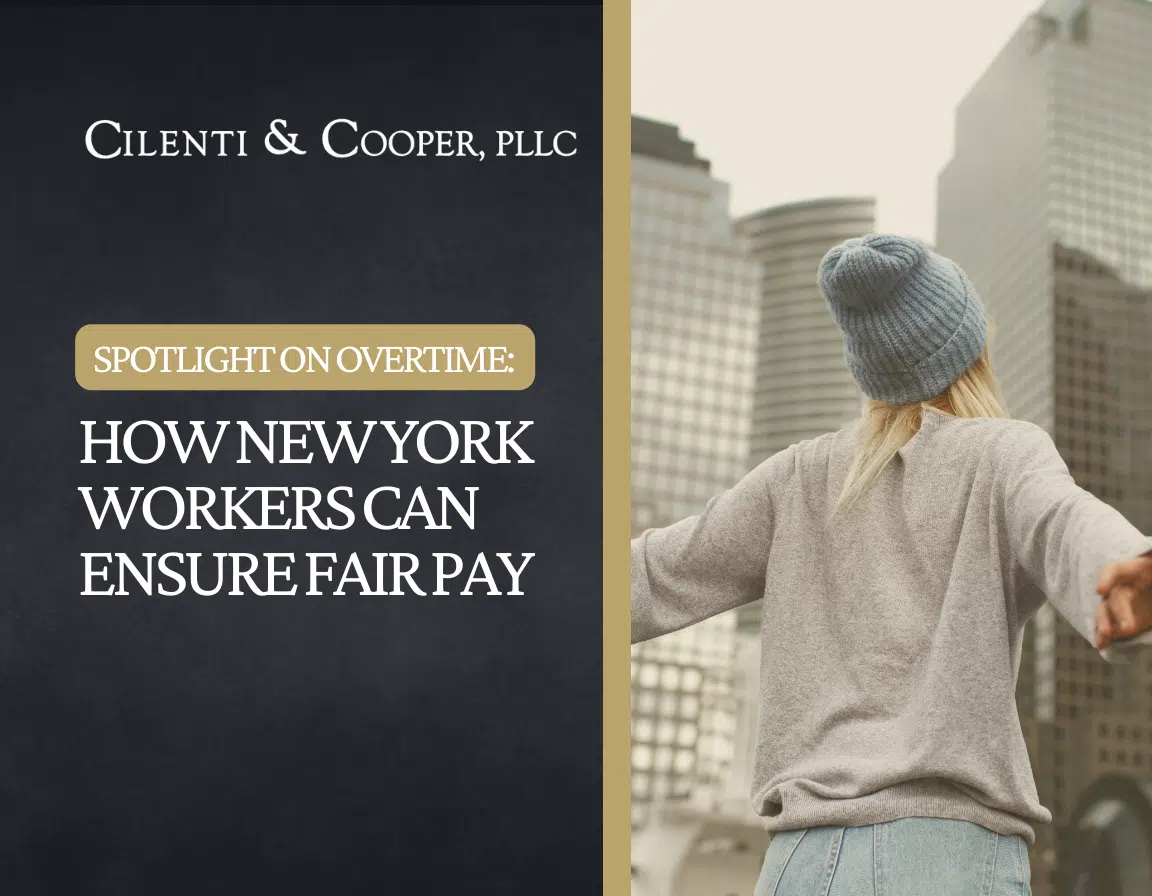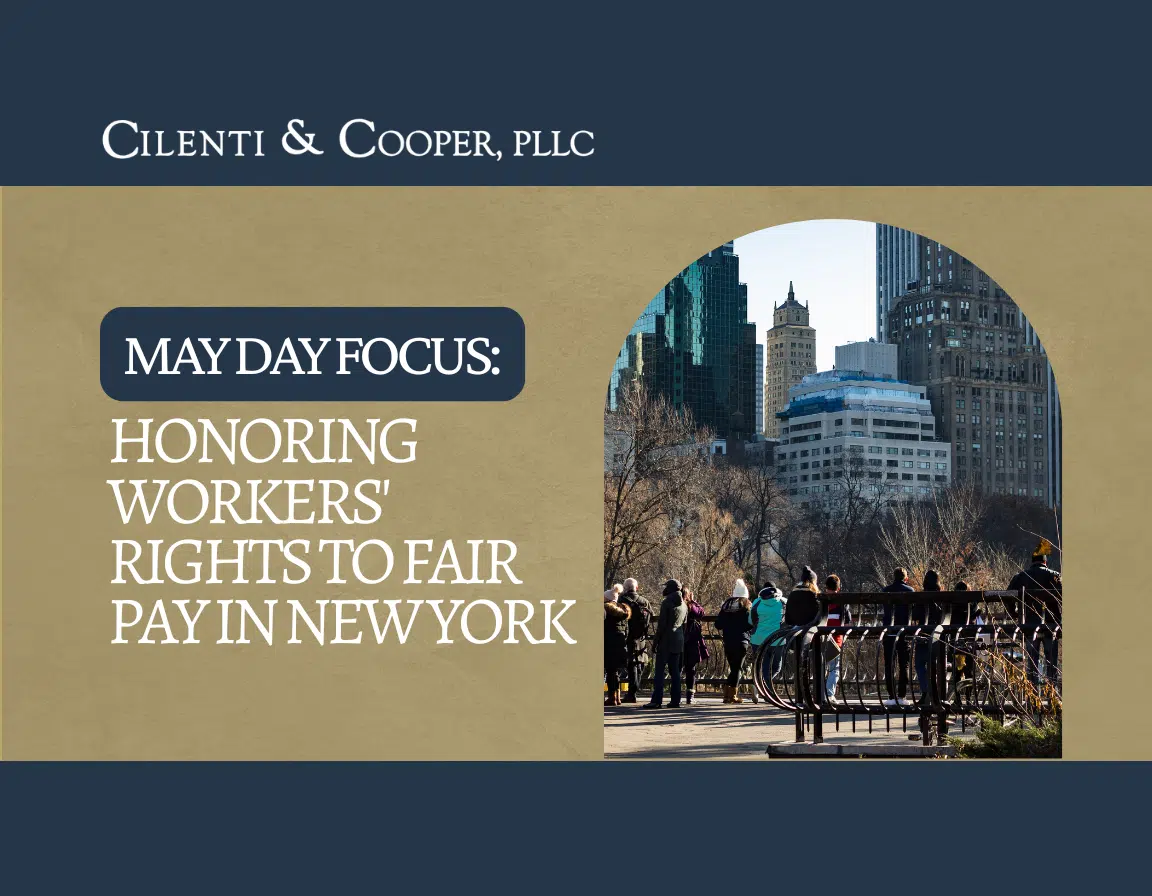Comprehensive Wage & Hour Law Services
Wage and hour laws govern the rates an employer can pay its employees and the hours for which an employer must compensate its employees. The most well-known wage and hour laws are minimum wage laws and overtime laws.
At Cilenti & Cooper, we are committed to ensuring that workers receive fair pay for every hour worked. Our experience in wage and hour law means we understand the intricacies involved in navigating and enforcing these regulations. We help employees who have been denied appropriate compensation and advise employers on compliance to avoid costly legal disputes.
-
1. Minimum Wage Laws
Federal Minimum Wage: Employers must comply with the federal minimum wage, currently set at $7.25 per hour. Some states and localities mandate higher minimum wages.
State and Local Minimum Wage: In many cases, the minimum wage varies by state or locality, and employers must adhere to the highest applicable standard. -
3. Unpaid Wages
Recovering Unpaid Wages: If an employee is not paid for all hours worked or at the appropriate rate, we can assist in recovering unpaid wages.
Final Paychecks: Laws surrounding the issuance of final paychecks can be complex, varying by state, and we ensure compliance to prevent disputes.
-
2. Overtime Pay
Standard Overtime Rate: Under the Fair Labor Standards Act (FLSA), employees are entitled to overtime pay at a rate of one and a half times their regular rate for hours worked beyond 40 in a workweek.
Exempt vs Non-Exempt Employees: Determining whether employees are exempt from overtime pay is crucial. Misclassification can lead to significant legal consequences. -
4. Meal and Rest Breaks
State-Specific Requirements: Employers need to be aware of and comply with state laws regarding meal and rest breaks.
Compensation for Breaks: Properly compensating employees for breaks, where required, is essential to compliance.
Choosing Cilenti & Cooper means aligning with professionals dedicated to protecting your rights as an employee or ensuring your compliance as an employer. Our team, led by skilled attorneys like Justin Cilenti and Peter H. Cooper, offers a detailed understanding of wage and hour laws and practical solutions to complex issues.
Lawyers in
Wage & Hour
If you believe your wage and hour rights have been violated, or if you need guidance on compliance, don’t hesitate to reach out to us. Contact Cilenti & Cooper today to schedule a consultation.
The Federal law that regulates fair pay in the workplace is called the Fair Labor Standards Act (“FLSA”). The FLSA protects employees from employers who violate overtime and minimum wage laws. New York and many other states have additional overtime and minimum wage laws as well. In general, where the federal and state wage laws have different requirements, employers are required to follow the rules more favorable to employees.
As of January 1, 2025, the minimum wage in New York City and Nassau, Suffolk, and Westchester counties is now $16.50 per hour, regardless of the employer’s size. For the remainder of the state (outside NYC, Nassau, Suffolk, and Westchester), the minimum wage is now $15.50 per hour. These rates are significantly above the federal minimum wage of $7.25 per hour. Each state has the authority to set its own minimum wage, which must be equal to or greater than the federal minimum wage.
The minimum wage in New York will continue to adjust annually, with planned increases until reaching a maximum of $17 per hour by January 1, 2026. This ensures that the minimum wage in New York will continue to rise, reflecting the commitment to provide a living wage for all workers in the state.
Generally, you must be paid “time and a half” your regular hourly rate for any time worked in excess of 40 hours in a workweek. In many instances, employers who pay some overtime fail to pay employees for all time worked. Even if you received some overtime pay, you may be entitled to additional money.
This depends on the duties your job requires you to perform. Jobs that meet certain very limited requirements are considered “exempt” from requirements. The exemptions to the law are based on job duties and certain pay requirements, not based on your job title given by your employer. The most commonly applied exemptions to the FLSA are often referred to as the “white collar” exemptions for certain administrators, executives and professionals. You should consult one of our lawyers to discuss if you are properly classified as an “exempt” employee.
The law allows you to recover the overtime and minimum wages you should have been paid within certain timeframes. In most cases, you can also recover double the amount of wages you are owed. If you prevail in your claim, you may also be awarded attorneys’ fees and costs.
No. Any kind of retaliation against an employee for participating in a lawsuit or administrative proceeding under the FLSA is against the law. An employer cannot fire or retaliate against an employee if the employee sues for unpaid wages. An employer who “blackballs” or demotes the employee, reduces the employee’s hours, shifts, or duties, or gives false poor performance evaluations, violates the law.
Employees are not able to waive their right to overtime pay. Regardless of the terms of your employment or any agreements you may have signed, your employer is required to pay you overtime if you are not exempt under the FLSA.
Frequently Asked Questions
















